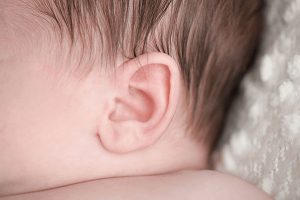Medical Evaluation
Medical Evaluation for Hearing Loss
Every infant with confirmed hearing loss and/or middle ear dysfunction should be referred for otologic and other medical evaluation. The purpose of this evaluation is to determine the etiology of the hearing loss and to provide medical management, if needed. The evaluation can also determine whether the child may have a hereditary syndrome associated with hearing loss that may put them at risk for other medical issues. Essential components of the medical evaluation include a complete medical history, family history of childhood onset permanent hearing loss, physical exam, and indicated laboratory and radiographic studies.
Researchers estimate that 30-40% of children with confirmed hearing loss also demonstrate developmental delays or other disabilities. The most commonly found additional disability is visual impairment. Mild cognitive disabilities are the next most common. Specific learning disabilities are third.
If etiology of the hearing loss is unknown after the initial evaluation, the following referrals should be considered:
- CT scan/MRI of the temporal bone for cochlear abnormalities. If cochlear implants are being considered, CT scan/MRI is needed to assess for potential candidacy.
- Ophthalmologic exam
- EKG
- Urinalysis
- Genetic evaluation
Refer for developmental pediatrics, neurology, cardiology and nephrology evaluations, as needed. Specialists should have pediatric expertise.
